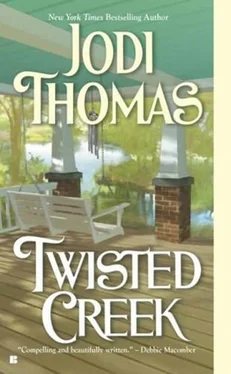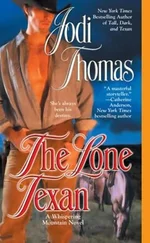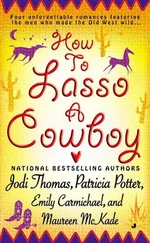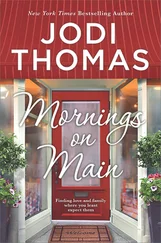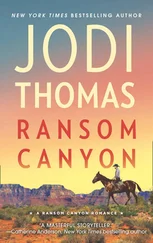
Jodi Thomas
Twisted Creek
© 2008
If rotten luck were a man, I’d have a stalker. In college I used to wait for just one of those “many blessings” my grandmother promised would fall down on me. All I got was a string of loser boyfriends and part-time jobs going nowhere. But that didn’t stop me from rounding every corner, hoping luck would be waiting with open arms.
During my junior year, about the time I thought my goal of teaching art might come true, my grandfather died, pulling any hope of finishing college out from under me. Since then, I’ve been tap dancing on the bones of dreams thinking I could make it rain.
Autumn in Memphis made me believe nothing would ever change. It had been almost five years since I’d left school and moved back in with Nana. We were no better off than we’d been that day when we’d returned home after my grandfather’s funeral to find the eviction notice. But we were together and for Nana that was enough. She was a solid in my life, always there, always caring.
On the outside I felt young. But inside-the part of me who clapped believing in fairies and danced down the Yellow Brick Road-was slowly petrifying into a cynic. I was aging on the inside, giving up on dreams.
Today felt like one more nail in my coffin. I could almost smell the lilies.
Pulling my van into the front yard of the duplex I shared with my grandmother, I concentrated on guessing what color they meant to paint the place and tried not to think about my boss at the greenhouse. He’d threatened to fire me for the third time. I’d been the low employee on the totem pole before and knew last-hired would be first to go when business turned bad. With winter coming on, the plant business was bound to turn bad.
I might have consoled myself that the nursery job wasn’t where I wanted to be anyway. It wasn’t where I belonged. But if I admitted that, I’d have to ask the next question. Where should I be? Most of my life I’d felt like the last guest at a dinner party. I kept circling the table looking for my seat as all the food disappeared.
Nana, my grandmother, opened the door of our place as I grabbed the mail out of the box. “How was work, dear?” As always, Nana reminded me of a hundred pounds of bottled sunshine.
I forced a smile. “Well, I didn’t kill any patients today.” I rubbed the tag on my uniform smock that read “Allie Daniels, Plant Doctor.” “But it was touch and go with an ivy determined to commit suicide.”
Nana grinned and followed me through the tiny living area, where I slept, and into the kitchen. “I’m sure you do the best you can.”
Flipping through the mail, I mumbled, “It may not be good enough. There’s talk of layoffs.” I paused, noticing a letter from Texas amid the bills. I stared at the fat envelope with interest. Though Nana had grown up there, she’d been gone too long for any relative or friend to be writing. I balanced the envelope on my palm, weighing it.
“You got to open it, Allie, if you plan to read it,” my grandmother said as she prepared our dinner-a can of pork and beans over toast.
I twisted a strand of my sun-bleached hair behind my ear and shrugged. “It can’t be bad news, Nana. Surely nothing terrible can travel three states to get us.” We’d been on the move for almost five years-first Kansas, then Arkansas, and now Tennessee. I’d hear about jobs opening somewhere with better pay and Nana would pack. We’d learned our lesson when Grandpa died. It didn’t pay to get too attached to a place or to people. The duplex was only ours while we paid the rent and people tend to forget they know you when times get hard.
Nana called us “corner peepers,” always thinking something better lay just around the bend. Every time we moved, I’d notify the post office in Clinton, Oklahoma, where I’d grown up, just in case someone was looking for us. No one ever had. Until now.
“What’s it say, child?” Nana’s voice had taken eighty years to mature into pure twang.
At twenty-six, I no longer considered myself a child, but I knew I’d always be one to her. “It’s from a lawyer in Lubbock.” I raised an eyebrow as I unfolded the papers. Nana loved me to read the mail, even flyers addressed to Occupant. I read the first paragraph, then frowned.
Nana leaned over my shoulder as if she could see the type without her glasses.
I straightened. “It seems this is the fourth address he’s tried.”
Nana dried her hands on her apron. “Well, whoever it’s from is persistent. What could he want with us?” I could hear the unsaid words in her deep breath that followed. We’d had bills find us before and somehow we’d managed to pay them.
I read the entire first page before I whispered, “I’ve inherited Uncle Jefferson’s lake property out on Twisted Creek.”
Nana looked up at me, her light blue eyes as clear with reason as ever. “You don’t have an Uncle Jefferson, Allie. Your mother was my only child.”
I knew the whole story. Nana had my mother during her change of life, and my mother had me at fifteen with half the freshman football team denying ever having known Carla Daniels and the other half smiling. Nana took over raising me when my mom left for college.
In truth, I barely remember Carla. She was always forgetting she had me. I was an embarrassment to her, like teenage acne, and she usually tried to cover me up. When she moved out at eighteen, no one was surprised she forgot to pack me along. About the time I started first grade, my mother was off to New York and a career. For a while she came home at Christmas, then she claimed she needed a chance to see the world. I’d only talked to her twice since my grandfather had died and I moved home. Both times my mother treated my call as if I were a telemarketer.
Nana lost all interest in the letter that made no sense. She set the table with cloth napkins and a plastic centerpiece as if we were dining on something other than a can of beans. Just before she sat down, she passed the wind chime hanging over the sink and brushed it lightly with her fingers. The hollow chimes I’d heard all my life tinkled through the kitchen.
I smiled at the sound and continued to read through the letter from the lawyer in Texas. When I flipped to the third page, a slip of paper drifted out and floated to the floor. Picking it up, I stared at a check for five thousand dollars made out in my legal name. In the bottom left corner, someone had typed “for traveling expenses.”
“Somebody must be playing a joke on us.” I handed Nana the check.
Nana pulled her glasses from her apron pocket and examined the paper. “It’s a cashier’s check. I’ve seen a few before, and they are good as cash.”
Taking another look, I reread the letter. “This can’t be for real, can it?”
Nana divided the beans onto two plates. “The part about Uncle Jefferson can’t be, but the check might. You could always go over to the bank and see. The Hamilton Branch is open until six.”
I glanced at the beans and decided to drive over and verify. What did I have to lose but a few minutes? The supper would taste pretty much the same cold. “I’ll be right back.”
Once en route, I called myself a fool for wasting gas to go to the bank. But once in a while I wanted to believe in a dream if only for a short drive. I had thought I’d find Mr. Perfect in college, marry rich, and build Nana a little house by the tennis courts. When that didn’t work, I was sure I’d find a great job even without a degree if I looked hard enough, and we’d travel together seeing places Nana used to tell me about. But I’d never found any job except the ones I took to pay the bills.
Читать дальше
